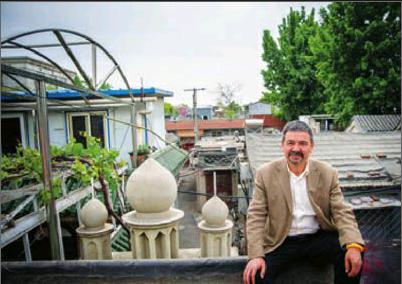‘I Am From Xinjiang’
2014-12-01ByJiJing
By+Ji+Jing

A widespread stereotype in China holds that migrant workers from the countrys northwestern Xinjiang Uygur Autonomous Region are people who work in coastal cities as street vendors of kebabs or nuts. However, photographer Kurbanjan Samats new book, I Am From Xinjiang, proves that people from the region are hardly limited to these typecast roles. Xinjiang natives work as doctors, reporters, teachers, company employees and more all across the country.
“I have stayed in Beijing longer than in Xinjiang,” said Aniwar Mamat, a 52-year-old ethnic Uygur and native of the far western region. Aniwar, who first came to Beijing in 1983, was among the first group of Xinjiang businessmen to arrive in the capital city after the launch of Chinas reform and opening up in the late 1970s. Before moving east, Aniwar ran a restaurant near the Urumqi Train Station.
“I came here because I wanted to live a better life,” Aniwar said.
Aniwar sold fruits and roast mutton kebabs before buying a traditional Beijing quadrangle courtyard and converting it into a Xinjiang-style restaurant in 2004. The restaurant, which was built to resemble a small mosque on the outside, is well-known among almost all Xinjiang transplants in Beijing.
The author Kurbanjan, who got to know Aniwar through his restaurant, featured the latter as one of the character sketches in his book. Published by China Citic Press, the book was released on October 16 and includes the authors photographs of 100 native Xinjiangers from a number of different ethnic groups, working and living in cities across the Chinese mainland. Next to each photo is a narrative of the subjects life, as told by each interviewee to Kurbanjan.
Craving greater understanding
Talking about his intentions behind publishing the book, Kurbanjan said that he wanted people from other parts of China to achieve a better understanding of Xinjiangers. In recent years, Xinjiang secessionists have committed a series of violent attacks in the region and elsewhere in China, and as an unfortunate result of this, Xinjiang residents are often looked upon with suspicion. Kurbanjan has encountered this sort of misunderstanding—and even discrimination—many times. He was once refused a room at a hotel because of his identity as an ethnic Uygur.
Kurbanjan said that he wants to tell people that violence may occur not only in Xinjiang but in many other places in China and throughout the rest of the world and that one small group of Xinjiangers wrongdoing cannot prove that all people from there are oriented toward violence.
“People from Xinjiang are no different than people from Sichuan or Shandong. Its unfair to stereotype us as terrorists or kebab vendors,”he added.
Kurbanjan initially wanted to make a TV documentary featuring Xinjiang peoples stories two years ago. Insufficient funding meant the plan was never to come to fruition. Then on March 1, five knife-wielding terrorists from Xinjiang killed 31 people and injured 141 others at the Kunming Railway Station in Yunnan Province. Kurbanjan felt miserable: On the one hand, he was deeply saddened by the loss of innocent lives, but on the other, he knew that the misunderstandings and stereotypes of Xinjiangers would be etched even deeper into peoples memories by the event.
He couldnt wait any longer. He immediately took photos of 30 Xinjiang natives that he knew and published them, along with each subjects story, on the Internet. The photos received wide attention from netizens, with many starting to look at Xinjiangers in a more objective and rational manner.
Seeing these photos, some natives of the region working and living elsewhere commented with tales of their own occupations and adopted cities. Following such an outpouring of support, Kurbanjan was able to track down and interview more people for his project. During the four months following the attack, Kurbanjan visited over 20 cities and photographed and interviewed more than 500 Xinjiang natives—not only Uygurs, but also Hans, Kazaks, Huis and Mongolians. He selected the stories of the 100 who moved him most and compiled their photos and narratives into a book. All the expenses for publishing it have come from his own savings.
“I wanted to provide an effective channel of communication between Xinjiangers and people from other parts of China through the book,” Kurbanjan told Beijing Review.
Eye-opening experiences
A member of the Uygur ethnic minority originally from Xinjiangs Hotan Prefecture, Kurbanjans experience is similar to those in the book who left the region and came to big cities to seek out a better living. After graduating from a college in Xinjiang in 2001, Kurbanjan began doing business there in order to support his family, including younger brothers and sisters who were still in school. At that time, the family was unsure what had become of the childrens father.
It turned out that the father, who was a jade dealer, had been robbed of the familys entire savings—2 million yuan ($327,000)—while doing business in Russia in 2001. Unable to bear such a misfortune, he left home and did not return until three years later. During this time, Kurbanjan dabbled in various businesses to help the family. In 2005, he got to know a couple from China Central Television (CCTV) shooting a documentary in Xinjiang. Learning of Kurbanjans love of taking photos, the couple offered him a job as an assistant photographer for their film. During shooting for the piece, Kurbanjan developed a deeper interest in cinematography and decided to pursue it further.
In 2006, Kurbanjan came to Beijing to study photography at the Communication University of China. During his three years study at the school, he put on several photo exhibitions featuring the Xinjiang landscape and people on university campuses in the capital city.
“The camera is my tool and photos are my language. As a photographer, I want to express my ideas through photos,” said Kurbanjan.
After his study at the university, Kurbanjan got a job with the CCTV Documentary Channel as a cinematographer. With two apartments in Beijing purchased from the leftover profits of his jade business and a wife and stable job, Kurbanjan should have been able to live a carefree life.
However, his desire to present the real Xinjiang region and its people in a clearer light never subsided, especially when occasional terrorist attacks erupted out west.
“I felt it to be my responsibility to present the Xinjiang people truthfully,” said Kurbanjan.
“Stereotypes are caused by lack of understanding,” said Zhou Wei, a professor with the School of Law at Sichuan University.“Media outlets should objectively represent reality in order to correct stereotypes and foster understanding.”
What Kurbanjan is doing to clear up such misunderstandings is establishing an effective way for people from the Xinjiang region to express themselves. His next project is to make a documentary about Xinjiang natives working away from home. As such an undertaking will require a lengthy period of time, he said he plans to resign from CCTV later this year.
“I plan to finish the documentary in three years and then go abroad to study anthropology. Maybe I will also include Xinjiangers living abroad in my documentary,” said Kurbanjan.
